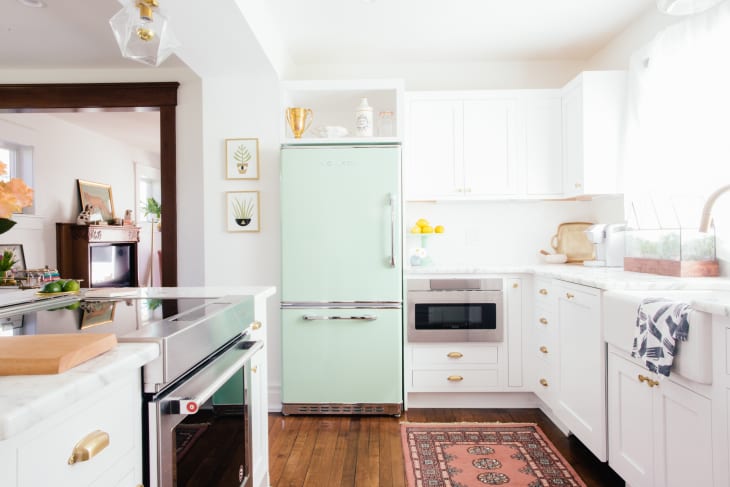The Weird Thing You Need to Know About Renting an Apartment in L.A.

It’s my third time moving in Los Angeles, and I haven’t even lived here for four years. That means I’ve spent more time on Craigslist, Zillow, Trulia, Rent.com, and Rental Girl than I want to know. I even have rental alerts that ping me once they’ve found a “match” that meets all of my dream home criteria (I haven’t disabled it because apartment hunting is one of my favorite hobbies #noshame). The one trend I’ve noticed in all my research and browsing (besides rent prices that make you feel slightly nauseous)? A lot of rental properties don’t include refrigerators.
Is this weird? I asked a few friends—some who live in Los Angeles, and some who live on the East Coast—if they’ve noticed this. The friends who live in California told me they thought this is fairly common—although they themselves make sure the property they’re looking at includes a fridge. Friends who live in New York, however, replied that this was unheard of. While most states don’t require property owners to supply tenants with appliances such as fridges, microwaves, or stoves, it’s still common practice to do so due to the competitive market. California, specifically Los Angeles, is seemingly different. According to a 2013 “Curbed” Q&A with The Rental Girls (LA’s top rental agency), 50 percent of properties in L.A. don’t come with a fridge.
A 2014 Yelp post also confirmed that LA’s Fridgegate is a thing. In a post titled, “Is it common in LA to see apartments for rent without refrigerators?” a user replied, “The established practice was Los Angeles apartments did not come with refrigerators. The trend is now they do. However, there are still a number of owners and management companies who only do the minimum.”
There are technically three reasons why you’re not seeing more refrigerators come with L.A. rentals. The first one is that your landlord isn’t required to give you one. According to The Los Angeles Times, your property owner isn’t mandated to provide a working refrigerator per California law because it’s considered an amenity, unlike electricity and basic plumbing, which are necessities. But like we said before, most states don’t require landlords to provide appliances—they generally do, though. California is definitely the oddball.
The second, is that the property owner might view the fridge as an expense they can do without. A landlord who rents properties all over Los Angeles told me, “Some landlords don’t want the extra cost of repair and maintenance that comes with providing a fridge.”
The third reason is that some property owners may feel like it’s actually not practical to provide one, since many tenants come with their own fridge. Since Los Angeles has the fourth highest percentage of renters in the country, and 50 percent of rentals don’t come with a fridge, it makes sense that many of those renters already have a refrigerator (either because they were forced to buy one, or because they chose to). The L.A. property owner told Apartment Therapy, “Because [many properties don’t supply a refrigerator, forcing renters to come up with their own solution], sometimes new tenants move in with their own fridge and the landlord has no place to store the existing fridge. And a fridge doesn’t keep well in storage if it isn’t plugged in!”
Buying a new refrigerator is pricey. A basic fridge will run you around $500, and one with all the bells and whistles (filtered water, ice maker, etc.) can cost you over $1,000. You can also buy a used fridge for around $200 on Craigslist or your go-to used furniture and appliances app (i.e. Facebook Marketplace, Letgo, Mercari, Gone, etc.) There’s a third option, and it’s one that I decided to take in college when I lived in Orange County and didn’t have even $200 to spare: I rented a fridge. It varies from city to city, but it’s easy to find a reputable rental business in your area with a quick Google search. Instead of purchasing a fridge, you rent one—and it’s about $30-75 each month (depending on the size and model). I’m currently renting a fridge for $32 a month (not because my rental didn’t come with one—it did, it was just the size of a suitcase, and I eat a lot of food). I was able to even avoid the delivery fee ($50) by paying six months’ rent upfront. This is a great option if you’re unsure if you’re going to stay put for more than two years.
But if you know you’re in it for the long haul and don’t like the idea of renting or buying a fridge, Rental Girl suggests negotiating with the property owner. If you offer a longer lease term, or put down a higher deposit fee, maybe they’ll be more likely to sweeten the deal with a refrigerator. If not, there are still plenty of rentals that include fridges.